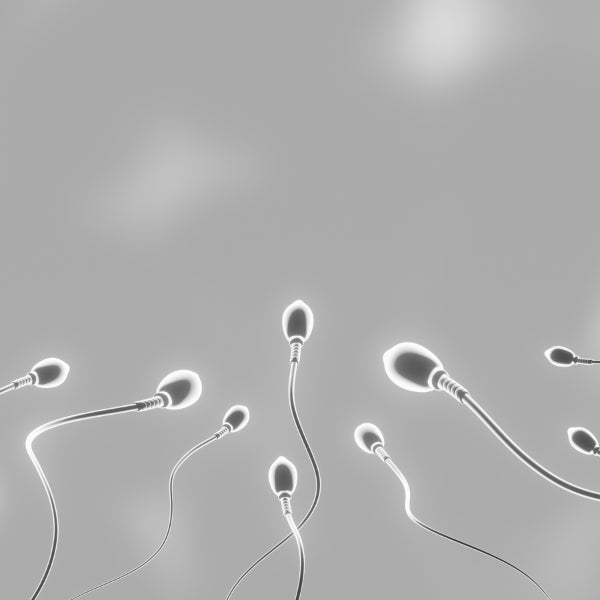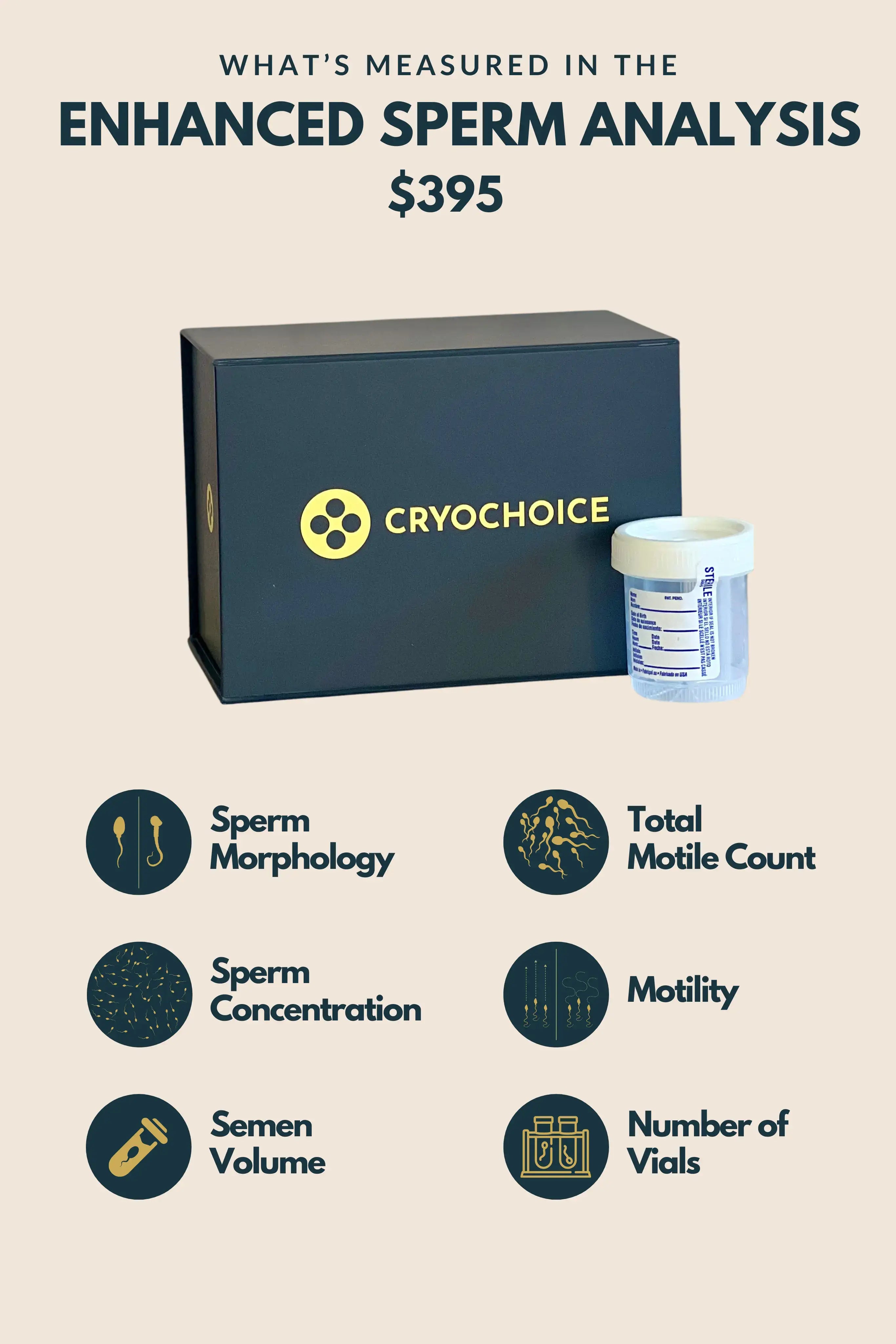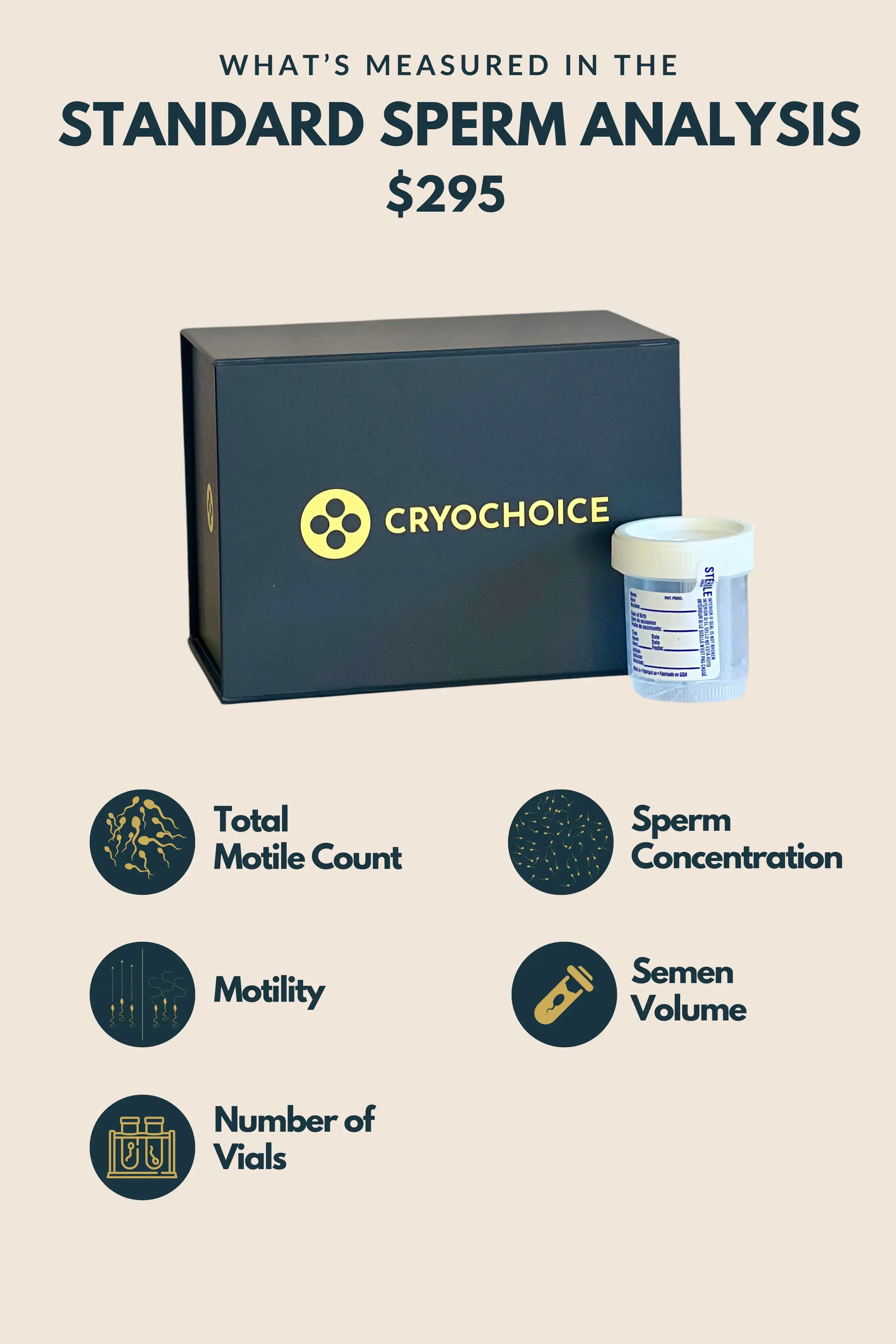
Sperm Analysis Options & Pricing
Test Your Sperm From Home
At-home sperm collection and testing kits offer a convenient and private way for you to assess your reproductive health at a clinical-level without visiting a doctor's office. These easy-to-use sperm analysis kits allow you to collect a sample in the comfort of your own home and mail it to a lab for professional analysis. Within days, you will receive detailed results about your sperm count, motility, concentration, and morphology - key factors that impact fertility. This information can help identify potential issues early, guide lifestyle changes to improve sperm health, or indicate if further evaluation by a specialist may be needed. For couples trying to conceive, at-home testing provides a simple first step to understand your fertility status. The accessibility and affordability of these kits make it easier than ever for you to be proactive about your reproductive wellbeing.
You can't Manage What You Don't Measure
What's Measured in the Sperm Analysis
Volume (Enhanced & Standard)
Volume, also known as semen volume, is the amount of semen produced during ejaculation. It's usually between 1.5 and 5 milliliters, or about ¼ to 1 teaspoon, per ejaculation. However, the World Health Organization (WHO) says that semen volume can range from 0.8 to 7.6 milliliters, with an average of 1–5 milliliters.
Total Motile Count (Enhanced & Standard)
This is the number of moving sperm in the entire ejaculate. It is calculated by multiplying the volume by the concentration (million sperm/ml) by the motility (% moving). There should be more than 20 million motile sperm in the ejaculate.
Concentration (Enhanced & Standard)
Sperm concentration is also known as the density of the sperm. Number of sperms may vary from 10 million/ml to more than 200 million/ml or 39 million per ejaculate volume.
Motility (Enhanced & Standard)
Motility is a measure of how well your sperm are swimming, at least 40% should be motile, or moving.
Morphology (Enhanced Only)
Sperm morphology, which refers to the size and shape of sperm, is crucial because it affects the sperm's ability to swim properly and fertilize an egg.
Post-Thaw Analysis: Motility (Enhanced & Standard)
Post-thaw analysis is an additional step taken after analysis to ensure that the samples are still viable after thawing and can be used in the future. Your concentration will be measured again. It is normal for a sample to have lower motility post-thaw.
Post-Thaw Analysis: Concentration (Enhanced & Standard)
Post-thaw analysis is an additional step taken after analysis to ensure that the samples are still viable after thawing and can be used in the future. Your concentration will be measured again. It is normal for a sample to have lower motility post-thaw.

Why does sperm morphology matter?
Sperm morphology analysis is a crucial component of fertility assessment. This examination goes beyond simple sperm count, evaluating the size, shape, and structure of individual sperm cells. A comprehensive morphology analysis can reveal abnormalities in the sperm head, midpiece, or tail that may affect fertilization capacity. By analyzing the percentage of normally shaped sperm, fertility specialists can better predict the likelihood of successful conception and identify potential underlying health issues. While other factors like sperm count and motility are important, morphology offers a unique perspective on sperm's ability to penetrate and fertilize an egg. For anyone seeking a thorough evaluation of their reproductive health, including a morphology analysis provides a more complete picture of their fertility status and can be a crucial step in family planning or addressing fertility concerns.

What's included in each sperm analysis kit?
- Overnight shipping to your home and to the lab
- A discreet shipping container
- Sperm preservative
- Printed instructions to help you collect your best specimen
- Insulated kit
- Collection cup
- A clinical-grade sperm analysis and comprehensive report to keep or share with your medical provider
Why Analyze Your Sperm
Frequently Asked Questions
Are At Home Semen Analysis Accurate?
Yes, modern at-home semen analysis kits, like those offered by CryoChoice, are accurate, convenient, and clinically validated. Our tests are processed in CLIA-certified labs using the same standards applied in fertility clinics. They measure key fertility markers such as sperm count, motility, morphology, and volume, giving you a reliable overview of your reproductive health.
While in-clinic testing may offer more specialized diagnostics, at-home sperm testing is an effective first step for evaluating male fertility from the comfort of your home.
How long does it take to get my sperm analysis back?
Results from a CryoChoice sperm analysis typically return within 2 business days after your sample reaches our laboratory. You'll receive a secure, detailed digital report that outlines key fertility metrics and provides clear explanations of what they mean for your reproductive health.
Our fast turnaround time ensures quick insights and actionable next steps, without waiting weeks for a clinic appointment.
Are my results shareable with my healthcare provider?
Absolutely. Your CryoChoice sperm analysis results are yours to share. Each report is downloadable and formatted for easy review by fertility specialists, urologists, or primary care physicians. This makes it simple to integrate at-home testing into your broader fertility care plan.
Our results include all medically relevant metrics, allowing for professional interpretation and follow-up when needed.
What if I want more than 3 kits?
Give us a call at (800) 619-7869 and we'll add the extra kits to your order. Additional kits will be at a discounted price.
Is a blood test required?
Infectious disease testing is not required to store your sample; however, it is recommended so you can use your sample in the future. Most fertility clinics require infectious disease testing to be completed within 60+/- days of your last collection.
What is the cancellation policy?
Used Kits: Within seven (7) days of your sample being processed, you may request a refund if your sample is not viable for storage. All monies paid will be refunded minus a $199 lab processing fee, a $75 kit fee (per kit) and shipping charges.
Current Client Cancellations: To cancel your storage, you need to email cancel@cryochoice.com. You'll need to send in a signed cancellation form and ensure your account is current. If you have an urgent inquiry, please call us at (404) 620-4607.
How do I retrieve my sample?
If you ever wish to retrieve your sample(s), simply contact CryoChoice. We will send you a Withdrawal Form to begin the process. Our CryoChoice Fertility Logistics Specialist will coordinate with your Fertility Clinic to arrange the logistics. A shipping and release fee will be assessed, and your sample will be prepared within 4 weeks of your request.
Your account must be in good standing and all shipping and release fees must be paid in full prior to your sample being released. These shipping and release costs include retrieving your sample(s), preparing the vial(s) for shipping, filling the cryogenic shipping tank with liquid nitrogen coolant, delivering your sample to the requested facility within the United States and returning the cryogenic shipping tank back to our lab.
Does insurance cover sperm testing with CryoChoice?
In most cases, insurance does not currently cover at-home sperm testing. However, some Health Savings Accounts (HSA) and Flexible Spending Accounts (FSA) may be eligible to reimburse the cost.
We recommend checking with your provider to determine if CryoChoice’s testing services qualify under your plan, and we’re happy to provide itemized receipts for documentation.
Does CryoChoice sell or donate my sperm?
No. CryoChoice does not sell, donate, or distribute sperm samples. Your sample is your private medical material and is stored, tested, or cryopreserved solely under your authorization. We adhere to strict confidentiality, ethical practices, and FDA guidelines for reproductive tissue storage.
Your sperm is never shared or accessed without your written consent.
Is sperm analysis the same as fertility testing for men?
Sperm analysis is a core component of male fertility testing, but it may not capture every aspect of male reproductive health. While a semen analysis provides critical data, like sperm count, movement, and shape, it doesn’t detect hormonal issues, DNA fragmentation, or anatomical concerns.
That said, sperm testing is often the first and most important step in understanding your fertility. If results show abnormalities, your provider may recommend additional evaluations or treatment.
Learn more in our article on what sperm analysis reveals about fertility

